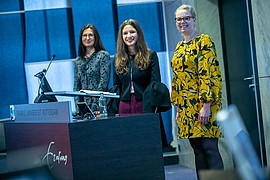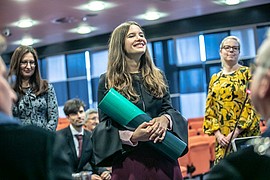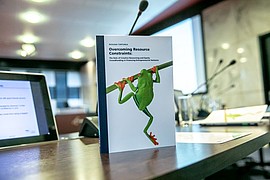PhD Defence: Roxana Turturea

In her dissertation ‘Overcoming Resource Constraints: The Role of Creative Resourcing and Equity Crowdfunding in Financing Entrepreneurial Ventures’, Roxana Turturea extends current knowledge about how entrepreneurs overcome resource constraints, without relying extensively on capital from “traditional” equity investors.
Roxana Turturea defended her dissertation in the Senate Hall at Erasmus University Rotterdam on Thursday, November 29 at 13:30. Her supervisors were Prof. Pursey Heugens (RSM), Prof. Justin Jansen (RSM) and Dr. Ingrid Verheul (RSM). Other members of the Doctoral Committee are Prof. Dimo Dimov (University of Bath), Prof. Wouter Stam (Vrije Universiteit Amsterdam) and Prof. Daan Stam (RSM)
About Roxana Turturea

Roxana Turturea is currently a Postdoc Researcher at Aalto University. Roxana regards herself as an Entrepreneurship scholar with a Strategy twist. Her research pertaining to Entrepreneurial Finance covers a wide range of contexts from crowdfunding to initial public offerings. More specifically, she examines how entrepreneurs persuade investors to invest in their firms, and how investors evaluate investment opportunities. Her research pertaining to Corporate Governance investigates how different forms of corporate governance (e.g., state ownership, block ownership) influence strategic decision-making in ways that ultimately affect firm performance.
Thesis Abstract

This dissertation extends current knowledge about how entrepreneurs overcome resource constraints, without relying extensively on capital from “traditional” equity investors. In particular, I build on research on creative resourcing (i.e., bricolage, bootstrapping) and on literature on equity crowdfunding, to investigate (1) how do bricolage and bootstrapping affect firm-level outcomes, (2) How do top management team (TMT) attributes influence the reliance of firms on bricolage and bootstrapping, and (3) How do crowd investors (i.e. investors in equity crowdfunding) identify high-quality opportunities to invest in.
The findings from the first two studies show that bootstrapping and bricolage are prevalent resourcing behaviors in small and medium-sized enterprises, and that these behaviors differentially affect firm outcomes. More specifically, bricolage enables firms to balance exploration and exploitation, and positively effects firm performance, whereas bootstrapping has a negative effect on firm performance. I also found supporting evidence that the socio-cognitive attributes of the TMTs fundamentally shape the willingness and ability of these teams to engage in bricolage and bootstrapping. The findings from the third study in my dissertation support the contention that crowd investors use heuristics (i.e. mental shortcuts aimed at reducing the effort required for a task), when evaluating investment opportunities. Most importantly, several heuristics, such as the disconfirmation and selectivity heuristics, help investors identify the more promising investment opportunities. These findings have important practical implications for investors, but also for entrepreneurs that can improve the way they interact with their (potential) investors.
Photos: Chris Gorzeman / Capital Images


